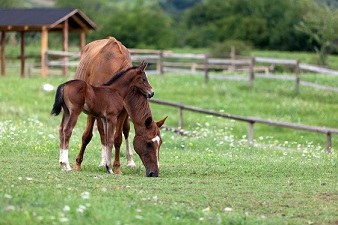WELLNESS PLANS FOR FOALS Vet Checks
Vet Checks
VET CHECKS
Unless the foal is unwell, a vet check should be performed 12 to 24 hours after the birth as this is the ideal period to conduct an IgG test for immunity. The vet will also be able to check the foal's leg, hoof, dental and overall conformation, and recommend any treatments if they are required.
DENTISTRY
At 6 to 12 months of age, or as recommended by your vet.
FARRIERY
It is ideal if your farrier can examine your foal's feet at 3 days, 3 weeks and 3 months of age, or as they recommend after the initial consultation.
NUTRITION
'Creep Feed' them while they're still with their mother. That is, feed the foal a bit extra of what you plan to feed it once weaned so that their palate and digestive system is accustomed to it.
ENVIRONMENT
Preferably a full-grassed paddock over a patchy one, with adequate shelter and fresh clean water. Pick manure every 2 to 3 days to help avoid worm infestation.
WORMING
Worm at around 4 to 6 weeks, then again 4 to 6 weeks later, then periodically every 4 to 6 weeks thereafter. Faecal egg counts can be performed when the foal is due to be wormed to assess the need for worming.
VACCINATIONS
At 3 months old a tetanus vaccination should be given, combined with the strangles vaccination if you prefer.
If you choose just to give a tetanus vaccine, after the initial 3 month vaccine give a booster 4 weeks later. Then give another booster 12 months later. Following this regime vaccinate annually.
If you choose to give the combined tetanus/strangles vaccine, give a tetanus/strangles booster 2 weeks after the initial injection, then another booster 2 weeks after that. Following this regime vaccinate annually.
At 4 months old a Hendra virus vaccination can be given. The foal will need to be microchipped at this time. An initial booster vaccination is required in 3-6 weeks, followed by a booster at 6 months. The horse will then require annual Hendra vaccinations.










Testimonials
"David and his team treat their client’s animals as if they were their own and have helped me and my horses in some very stressful situations over the years, thankfully, always with a excellent outcome!"
"Thank you so much for the extra good care you took of Lilly ... I’ve always been extremely happy with Dave as our vet, I think he truly does a wonderful job, and you can really see how much he cares.”
"The fact that Dave has been my vet for many years speaks volumes. Dave has a very nice manner and deals with the horses in a calm and kind way. He always takes time to explain options and procedures and to advise on what he considers to be the best course of treatment."
"Although we may have moved, we would not consider using any other veterinarian other than David to care for our horses."